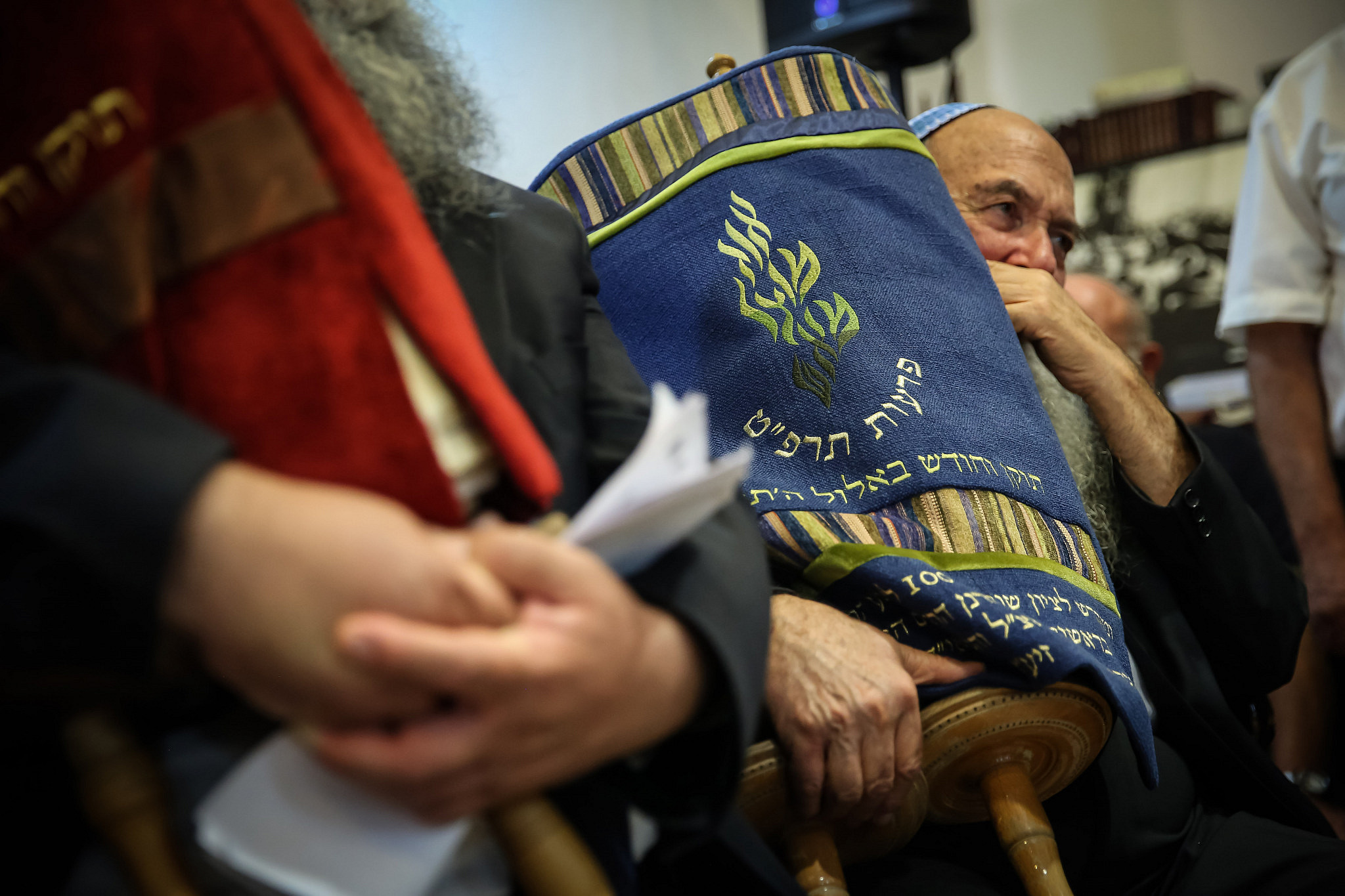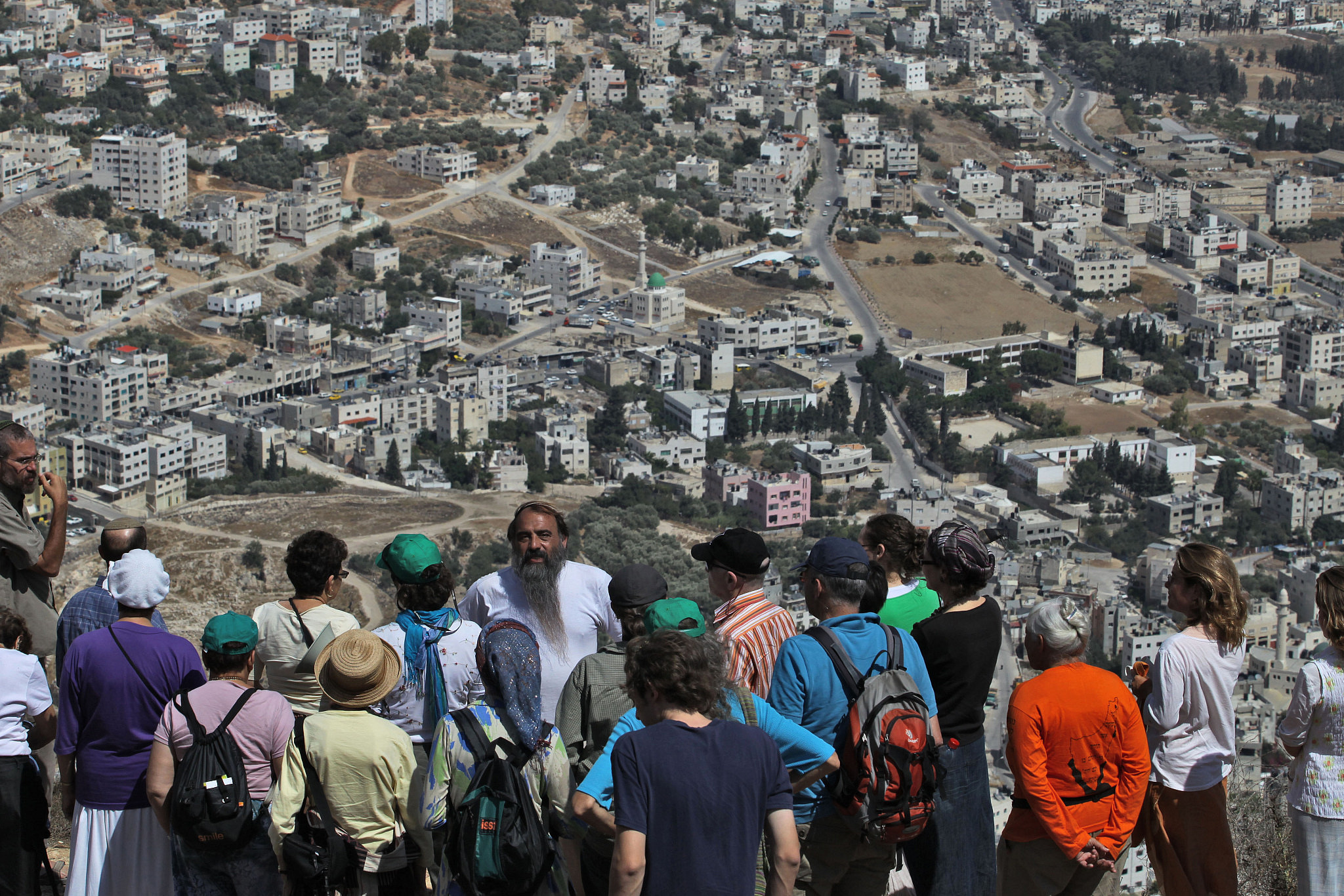“The Dawn of Redemption: Ethics and Tradition in a Time of Power,” Mikhael Manekin, Evrit Publishing House, 2021 (Hebrew)
In 1988, a year after the First Intifada erupted across the occupied territories, I was a soldier in the Israeli army sitting in the back of a small transporter with my unit. We were travelling from one place to another in the West Bank, when we picked up a soldier who was heading to the casbah, or citadel, in the Old Town of Nablus. We dutifully drove him to about 100 meters from the casbah. It was an autumn mid-afternoon and the area was teeming with life, the sounds and smells of an open market, children running, fathers buying food for their families.
Then, this lone soldier — in full battle gear, helmet on, magazine in his rifle — got out of the vehicle and walked straight toward the entrance, asserting confidence and authority amidst the crowd of Palestinians. It was a demonstration of what Israelis call “ribonut” — literally “power” or “sovereignty,” but in another form, “national hubris.”
The soldier sitting next to me looked at the soldier marching into the casbah, then turned to me, stunned. “What the fuck are we doing here?” he said, as we drove off.
I begin with this anecdote because Mikhael Manekin’s book, “The Dawn of Redemption: Ethics and Tradition in a Time of Power,” also begins with an anecdote that is both more comical and tragic than mine. As a young religious soldier, Manekin found himself somewhere in the occupied West Bank and needed to urinate. He went into the bushes on the outskirts of a Palestinian village to relieve himself, when, with his pants down, he discovered an elderly Palestinian woman staring at him. In that jarring moment, Manekin realized the immorality of his presence (my translation from Hebrew):
I am living in her home against her will. I took her home by force. And now I stand with my pants down, like an animal (pera adam). In the army I always wear a kippah, at that moment too, but the woman could not see it under my helmet. But I knew it was there. All this wasn’t intentional, although I suppose I could have noticed her before I dropped my pants. If there was one moment in my life that I knew instantly that I was desecrating God’s name, it was that moment.
In some ways, “The Dawn of Redemption” is an elaborate extension of that moment of shame and realization when the sovereign understands the brutality of his power. In that instant, both Manekin and the Palestinian woman are powerless — but he knows, and she knows, that once he pulls up his pants, he is the ruler and she is the ruled.

Many Israelis have experienced similar revelatory moments. Patriotic in their Zionism, countless young soldiers spent their time exercising ribonut over another people, yet came out of the army disenchanted, disappointed, and confused; many even departed the army more left-wing than when they had entered. When one comes face to face with the destructiveness of their own power, the heart is aflame, the mind is bewildered, and everything they thought they knew is blown apart.
Messianism through subjugation
“The Dawn of Redemption” reflects on the power, abuses, and failure of religious Zionism as an institution of power in Israel today, written by a man inside its orbit who is desperate to find a remedy for his own sake. A prominent Israeli leftist and deeply religious Jew, Manekin served as the director of the anti-occupation veterans’ group Breaking the Silence during its early years, before heading the Jerusalem-based think tank Molad; he is now the Israel director at the Alliance for Israel’s Future, a political fellowship network for Arab and Jewish citizens.
Manekin joins a long line of religious Zionist thinkers — from rabbis Yehudah Amital and Aharon Lichtenstein, to Rav Shagar and Menachem Froman, among others — who recognized the brutality of Israel’s ribonut and tried to cultivate an alternative vision for their beliefs. In the 1960s and 1970s, especially after the Six-Day War, many Orthodox Jewish thinkers in the United States (like David Hartman and Irving “Yitz” Greenberg) warned their constituents that the real challenge facing Judaism in the late 20th century would be how to integrate political power into a religious vision that would maintain a moral compass developed over centuries.
Manekin argues that religious Zionism has failed that test, and that in doing so, it has created a monstrous “new national religious Jew” who has been convinced that power, not mercy, stands at the epicenter of religious life.
There is a largely unspoken thesis that lies at the core of “Dawn.” Religious Zionist thinkers from Abraham Isaac Kook (chief rabbi of Mandate Palestine from 1921-1935) to R. Isaac Ha-Levi Herzog (chief rabbi from 1936-1959) envisioned the relationship between religion and state as symbiotic, whereby religion would eventually have the upper hand and influence the moral center of Zionism’s secular vision. Kook, in a more mystical and romantic vein, and Herzog, in a more practical one, believed that it was worth it for religious leaders to support such a polity (an idea that was not at all popular in their time) because the ethical and devotional elements of Judaism would slowly transform the Zionists’ radical and rebellious secularism.

Manekin’s thesis is that the inverse happened: secularism has all but swallowed the religiosity of religious Zionism, turning the latter into a tool that justifies the secular state through theological arguments. The devotional and ritualistic practices of religious Zionism (halakha) remain operational, but its moral foundations have collapsed into a vision of sovereignty through conquest, what Manekin somewhat unreflectively calls simply “the secular.”
It is not that Kook and Herzog were wrong; for Manekin, it is more tragic than that. The mix of theological chauvinism and secular violence has created a state that, in effect, has taken the worst iterations of both. Religious Zionism, argues Manekin, once viewed the state as a temporary reality to be transcended in a messianic moment. Now it sees the secular state as the permanent goal of its theology: messianism enacted through subjugation. In short, unadulterated ribonut.
Manekin brings an anecdote in another context to illustrate this inversion. In the late 19th century, the British Jewish banker Baron de Rothschild visited Palestine and the Kotel (Western Wall) in Jerusalem and called for expanding the area around it, which at that time was an Arab Palestinian neighborhood. The ultra-Orthodox Jews of the Old Yishuv refused. The prominent journalist Itamar Ben-Avi — the son of Eliezer Ben-Yehuda, who founded the modern Hebrew language — proposed to destroy the Arab neighborhood and build a space for Jews to pray (this was done several decades later after the Six Day War); Ben-Avi later wrote a book about it entitled, Hear O Israel, The Wall is Ours, the Wall is One.
This violent disregard for non-Jews living under the sovereignty of Zionism would come to dominate the religious Zionist ethos after 1967. And while both the Israeli state and religious Zionism are certainly far more complicated than suggested here, and include secular and religious circles devoted to building a just society that treats others with dignity and respect, Manekin’s book rightly identifies the alarming trend that has morphed religious Zionism as a source of political power and institution of the state.
Revenge as a religious imperative
To explain how this transformation happened, Manekin uses the life and letters of his maternal grandfather, or sabba, as a specter that hovers over the entire book. Sabba, a man by the name of Yechiel Mikhel Becher, was what one could call a “good Jew” (yehudi tov). A Jewish immigrant to Palestine from Poland, he was a religious man but not an ideologue, a Zionist but one who maintained a deeply humanistic core cultivated in his early religious life. He had sympathy for the oppressed because he himself was oppressed. Manekin does not harbor nostalgia for his grandfather — he knows that the world Mikhel inhabited is long gone — but he laments the loss of balance and empathy that sabba represented.

For Manekin, the key question facing religious Zionists today is no longer the individual moral question of “How should I behave?” but rather the national question of “How should a Jewish state behave?” The problem, Manekin suggests, is that the national question has easily effaced, even erased, the moral one.
One of the examples Manekin brings to illustrate the moral failure of religious Zionism is the infamous October 1953 massacre in the West Bank village of Qibya, which was then occupied by Jordan. On orders from above, a group of Israeli soldiers led by Ariel Sharon slaughtered at least 69 Palestinian civilians in the village, the majority of them women and children. The assault was framed by the Israeli army as a retaliation for the murder of a Jewish woman and her two children in the town of Yehud. The act was uniformly condemned, even as Israeli Prime Minister David Ben-Gurion was more sanguine; as he told Sharon, “It doesn’t matter what the nations will say. What matters is controlling the Arab area. In that we have succeeded.”
What strikes Manekin about the Qibya massacre was less the event itself than the justifications that came from some figures in the religious Zionist camp, who defended the killings as an act of legitimate revenge (nekama), and offered it as a halakhic framework of contemporary warfare that enables the slaughter of innocent non-combatants.
As Manekin reads it, religious Zionism became a kind of “neo-biblicism” (my term) which, ironically, mimics a form of tribal secularism. The moral center of rabbinic teaching succumbed to the pure expression of power as a tool of control. Revenge became a religious imperative, not in theory or in fantasy, but in the justification of military power and murdering innocent civilians. Whereas the secular Ariel Sharon described Qibya as “necessary,” the religious Zionist Rabbi Shaul Yisraeli defined it as “holy.” In other words, Sharon’s military “pragmatism” now carried theological weight.
Perhaps the most forceful response to the Qibya massacre, and to religious Zionism’s defense of it, was the unequivocal condemnation by a young Yeshayahu Leibowitz. Leibowitz was an Orthodox Jew but secular Zionist intellectual who later became one of the most ardent critics of Israeli militarism. For him, the problem begins the moment religion is used to determine any actions or values in a secular state, emphasizing that religion and state had to function independently in order to protect the integrity of both. Leibowitz didn’t believe in “Jewish” ethics: in his mind, there was simply ethics.

The notion of religion as necessarily distorting state values, however, is something Manekin cannot accept. This is in large part because he believes in the positive potential of religious values in a secular sphere — even as they have been deeply undermined in his community. In other words, unlike Leibowitz, Manekin’s critique of religious Zionism is in its choices, not its nature.
‘A new Torah of the goy’
Another way Manekin gets at the problem of religious Zionism is in the hazard of thinking that Zionism has ended Jewish exile, a common belief among both religious and secular Zionists. In a 1975 interview with historian Muki Tsur, the Kabbalah scholar Gershom Scholem noted that “Zionism is a calculated risk in that it brought about the destruction of the reality of Exile. The foes of Zionism certainly saw the risk more clearly than we Zionists.”
Relatedly, Manekin uses the famous poem “Qibya” by Yiddish poet Jacob Glatstein to make a stronger point: that maybe Jewish morality cannot survive Jewish sovereignty. Perhaps, as Manekin writes, “A Jew cannot be tolerant (savlan) in the state of Israel’s ribonut. [Perhaps] the morality of my grandfather and Glatstein was murdered in Lublin on the foreign soil of Poland.”
There are many religious Zionists who would applaud this deflection of exilic morality. Some would argue that the kind of morality which Manekin and Glatstein speak about is only relevant in exile, not in a state where we are the sovereign. Other may say that we must be moral, but still defend immoral actions as “necessary” for nationalistic ends.
Manekin does not buy either of these views, arguing instead that part of religious Zionism’s problem is in believing itself to be on the other side of exile. “The state of Israel is not redemption and also does not nullify redemption. The state of Israel is a political reality of a portion of the Jewish people,” he writes. Manekin thus reframes his original question from “How should a Jewish state behave?” to “How should a traditional Jew, and a traditional Jewish community, behave when it has power and independence?” Manekin won’t let his belief in the “morality of exile” inform the reality of sovereignty. He refuses to believe his sabba has become totally irrelevant.
Some religious Zionists have recently sought to cut the pie differently. The Israeli philosopher Micah Goodman, for example, argues in books such as “Catch 67” and “The Wondering Jew” against the temporary nature of the secular state. Unlike Kook, he does not hold out for a transformation via divine fiat but opts to inject religious values into the secular Israeli project.

Halakha, as traditionally construed, is indeed an exilic mode of behavior for Goodman, but he wants to reinvent it beyond its original intent to build walls, and rather deploy it to build bridges between the religious and the secular. This is not a new idea, but was articulated decades earlier by David Hartman in his celebrated essay, “Halakha as a Shared Spiritual Language.” In a sense, Goodman “secularizes” religious values to bridge the divide between the two camps.
But Goodman does not solve Manekin’s problem, because his vision does not include the non-Jew — that is, the Palestinian — as a partner in the project. In Goodman’s world, the non-Jew is simply an outsider without real agency, who may be treated with dignity but ultimately ruled over by the Jewish hegemon. This only works — if it works at all — on his premise in “Catch 67” that the land is not occupied, only the people are occupied. You can thus alleviate the occupation, but not end it through equality or tolerant policies.
To put it bluntly, Goodman is an occupier who has found liberal language to justify an illiberal project. And if you maintain, quite rightly, that both the land and the people are occupied, then Goodman’s argument collapses.
Manekin, on the other hand, argues for a “new Torah of the goy” (gentile) — that is, that the non-Jew, the Palestinian Arab, must become a subject of a new halakhic discourse, not just a walk-on in a Jewish drama. Ishai Rosen-Zvi and Adi Ofir’s book “Goy” can be of help, if only to trace the genealogy of the goy as an invention of the Jew. And in a diasporic context, Zalman Schachter-Shalomi decades ago argued for a similar approach to conceiving the non-Jew not as an enemy but as a partner in the larger Jewish and global humanistic project.
A “new Torah of the goy” is arguably just as necessary in Israel’s struggle to negotiate its own ribonut. Religious Zionism, however, does not fulfil this in its current condition: it simply translates the exilic halakha to the new context of state power, likening the Arab to the Polish peasant — except now, it is the Jews who have the guns.
The potent drug of power
The unanswered question in “The Dawn of Redemption” is whether there really is a way back to the religion of Manekin’s sabba, and whether the poet Glatstein was right in saying that power — especially when exercised by divine mandate and in the wake of the Nazi genocide — cannot cultivate mercy and empathy. Hannah Arendt warned in 1947 that establishing a country in a condition of collective trauma, where power could be wielded by the traumatized against a newly traumatized people, would not go well. People scoffed at the suggestion. Manekin shows that Arendt was right.

Can religious Zionism overcome its attachment to settler colonial conquest and its messianic belief in power? Manekin believes the institution can be saved — but it’s not really clear why. For Manekin, religious Zionism should be saved because that is the ideological space in which he lives. That is where he prays and where he chooses to educate his children. Manekin wants a better life for his family and a more moral society to live in. He does not want to feel both shame and guilt when he stares into the face of an elderly Palestinian woman on her land. He does not want her to hate him, and he does not want to rule over her.
While understandable, I am not sure that this is a sufficient reason to aspire for its redemption. When Scholem noted that Zionism’s erasure of exile was a “calculated risk,” he was implying that it was a gamble that could fail. Indeed, by the early 1970s, Scholem became outspoken about what he negatively deemed the “neo-Sabbateanism” of the Israeli settler movement — that the settlers, and perhaps the religious Zionism that supported it, had become truly and dangerously heretical.
I therefore doubt that the chauvinism that pervades religious Zionism today will grant Manekin his wish. Those who have power do not cede it easily, especially when they claim it as a divine gift. It is a potent drug that hides and relieves fear, and makes the weak feel strong.
The bigger question is how deeply religious Zionism is embedded in Israel today. For Palestinians who live under the thumb of the Zionist state, does it really matter if the hegemon believes its right to rule is divinely ordained? Probably not. Manekin’s focus is not on the question of Zionism in general — but given that religious Zionism arguably dominates the narrative today, Manekin’s diagnosis of its demise has much larger ramifications. When religion becomes the justification for secular power and domination, changing the minds of believers becomes an enormously difficult task.
Perhaps the battle for Manekin’s sabba is already lost, and all we can do is pick up the shards of what might have been. Yet Manekin doggedly has not abandoned hope for religious Zionism. To honor that doggedness, I give him the last word, from the conclusion of his book:
The Jewish world has changed enormously in the past century. And more specifically the life of power (koah) and independence (azmaut) has placed an enormous burden on us. We must remember not to be arrogant and not to become mired in the dark recesses of our base instincts that now characterize those who have power. The traditional world (olam ha-mesorti) makes this possible and obligates us to find a way. It makes possible and obligates us to aspire toward a full redemption. It makes faith possible. The first step is to separate ourselves from the mentality of power (ba’alei koah).
Correction: The reference to Baron de Rothschild has been corrected from Baron von Rothschild.

